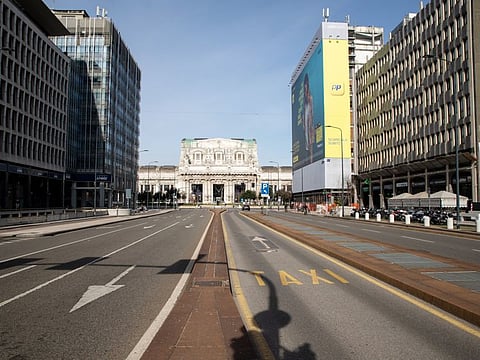Italy lockdown essential to stop coronavirus
People’s cooperation vital for success of Conte government’s plan

Italy’s unprecedented peacetime measures that virtually locks down the country may seem extreme, but they are essential to contain Europe’s worst outbreak of the coronavirus. The contagion, which has killed at least 630 Italians and infected 10,000 more, has prompted Prime Minister Giuseppe Conte on Monday to order a nation of 62 million to “stay at home”.
Under the quarantine regulations schools, cinemas, theatres, museums, gyms, spas and ski resorts have been closed. Public gatherings, including sports events, weddings and funerals, have been banned. Bars and restaurants can remain open till 6pm, and police are enforcing rules that customers stay one-metre apart.
Italians are told to avoid travel unless it is for “urgent, verifiable work situations and emergencies health reasons”. With the stringent measures, Italy hopes to replicate the success of China, which slowed down and stopped the virus with a range of severe measures that include travel restrictions.
The fear is that the epidemic will become impossible to manage, as it places enormous strain on the health sector. Already there are reports of a shortage of masks and glovesGulf News
While it worked in China, it may be difficult to impose such measures that curtail fundamental liberties in a democratic country.
It was not an easy decision for the Conte government, especially at a time when the country’s economy is suffering. The sharp contractions in domestic and foreign demand must have sent jitters through Rome. That explains the openness to allow people to go to work.
The fear is that the epidemic will become impossible to manage, as it places enormous strain on the health sector. Already there are reports of a shortage of masks and gloves. Doctors and other medical staff are not allowed to go on leave. Emergency rooms are filling up.
This is a medical emergency like no other. Italy’s actions are the harshest in Europe and it reflects the magnitude of the outbreak. Germany, France and the UK and other European countries too may have to grapple with the same dilemma. If the steps in Italy succeed, these lessons could be adopted by the rest of the world.
Coronavirus, no doubt, is a dangerous epidemic. Covid-19 has killed nearly 4,300 people in 114 countries, and more than 118,000 cases have been reported around the world. These are extraordinary times. And they call for extraordinary measures. Italy’s lockdown may be severe, but they are required to contain and eliminate the raging pathogen.
The success of the Conte government’s plans depends on Italians. Without their collaboration, these efforts will be futile. So people should trust the government and its methods to tide over the health crisis and return to a normal life.
Also Read: Italy prison riots over virus leave 11 dead
Sign up for the Daily Briefing
Get the latest news and updates straight to your inbox



